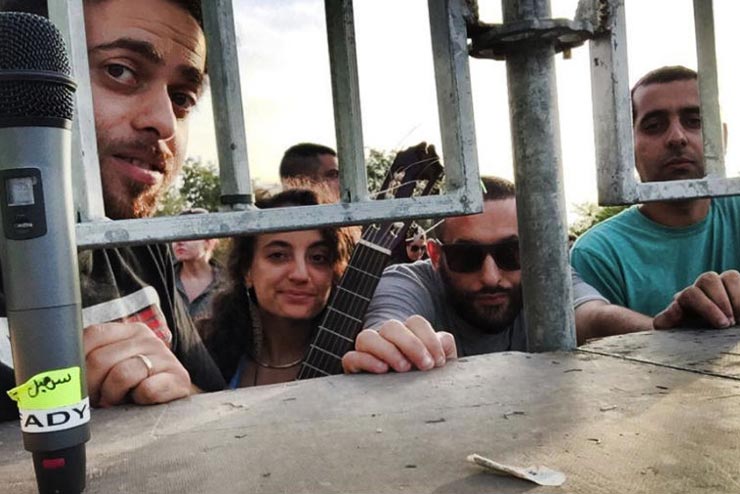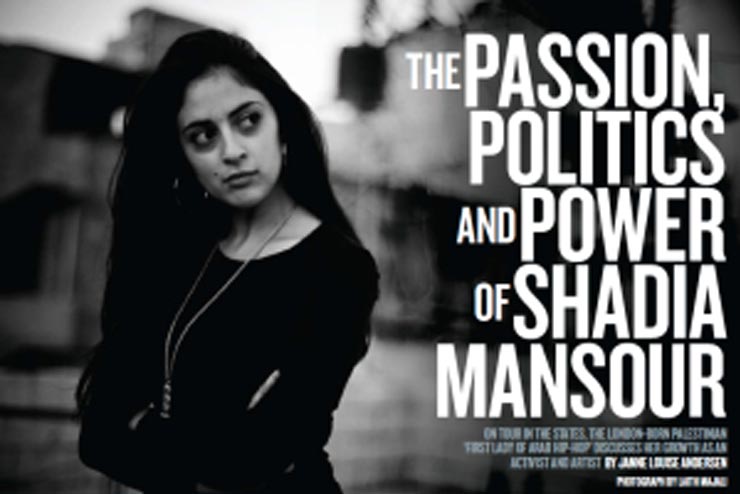by Emily Gogolak
In 1999, Tamer, his younger brother Suhell, and their friend Mahmoud Jreri, also from Lod, Israel’s most notorious ghetto, started the hip-hop group DAM—which means eternity in Arabic, blood in Hebrew, and stands for Da Arabian MCs in English. The first Palestinian rap crew and among the trailblazers of early Arab rap, DAM overlaid hip-hop beats with Arabic melodies and lyrics that brought their music back to the genre’s 1970s roots: protest.
It all started with Tamer, and his infatuation with American rap legend Tupac. In the mid-1990s, the teenaged Tamer started watching music videos by the late West Coast rapper, and what he saw on the screen—the grimy, crime-ridden streets of Los Angeles—looked all too familiar. It looked like home. Nafar hails from Lod; and though only a 20-minute drive from the tree-lined boulevards of Tel Aviv, the city’s narrow, gray streets—lined with graffiti, broken glass, and crumbling houses—couldn’t seem more removed. Safety was a luxury foreign to Lod, and during Tamer’s childhood, neighborhood stabbings were routine and shootings were on the rise.
Tamer also recognized the discrimination and racism Tupac decried. Both men were of minority groups with a history of discrimination: Tupac an African American in what he called “A White Man’s World” and Tamer a Palestinian citizen of Israel, an “Israeli-Arab.”
Unlike the hundreds of thousands of Arabs who fled Palestine in 1948, many remained on the land that became Israel and now live as citizens of the Jewish state. Today numbering over 1.2 million, Israeli-Arabs face a tough reality. Structural inequality, unemployment, and crime are constant threats, and according to a 2009 OECD report Israeli-Arabs, who today make up 20% of Israel, face a poverty rate of 50%.
And the Israeli-Arab problem doesn’t end there. Not only do Arabs face discrimination in Israel, but they are also largely unrecognized by the greater Arab community, who see them as traitors for living in the Jewish state. “Israelis don’t like us because we’re Arabs, and the other Arabs don’t like us because we have Israeli passports, because we are citizens,” Mahmoud of DAM told the Independent. But if he is a citizen of Israel, he only sees himself as a second-class citizen. “Having an Israeli passport means nothing. When I go to the airport, they still think I am a terrorist. It doesn’t matter what you call us,” he said. “We live in a racist country.”
Listening to rap music, Tamer saw a way in: it was a way to resist his circumstances. He started writing, throwing down beats, and telling his family and friends that he wanted to be a rapper. “They thought I was joking,” said Tamer, a wiry 32 year-old with a sharp tongue and a wit to match. “And, I kind of thought I was joking too.” A couple of years later, however, Tamer was already performing solo in the then-small but burgeoning Israeli hip-hop scene, making a name for himself as the first Palestinian rapper and even sharing the stage with Jewish Israeli artists. “It was a family scene,” he explained, “but it wasn’t political. It was for nice things like peace and all that shit but it wasn’t about reality.”
BREAKING IT DOWN
But when Tamer joined Suhell and Mahmoud to form DAM, things changed. “We opened our mouths” Suhell told the Independent, “We got with reality”—and it wasn’t a pretty picture. The Second Intifada erupted in September of 2000 and violence between Israelis and Palestinians rose to heights unseen in years—eventually claiming over 5,500 Palestinian and 1,100 Israeli lives. Racism between the two groups was as vicious as ever, and DAM had something to say about it. Taking a line from American rapper DMX, Tamer explained, “We wanted to tell Israelis, ‘Walk in our shoes, and you’ll hurt your feet.’” Arming themselves with their lyrics, DAM called for people to walk in the Palestinian’s shoes before judging the rock-throwing youth of the uprising.
In 2000, they released their first single “Innocent Criminals,” recorded in Hebrew over the beat of Tupac’s “Hail Mary.” And a few months later came DAM’s big break “Mein Erhabi” (“Who Is the Terrorist?”). The track went viral, and was downloaded over a million times after its free online release—quite a feat for a hardly known DIY rap group with no record deal.
The lyrics, rapped in Arabic, were fearless:
You jump to say
“You let small children throw stones!
Don’t they have parents to keep them at home?”
WHAT?!
You must have forgotten you buried our parents under the rubble of our homes
And now while my agony is so immense
You call me a terrorist?
When dialogue between Israelis and Palestinians had turned into bloodshed during the Intifada, anything strongly pro-Palestinan or pro-Israeli came across as threatening to the other side. And Israelis were outraged with DAM, saying that it was supporting terrorism and sympathizing with the suicide bombers who were blowing up buses in Tel Aviv. Subliminal, Israel’s most popular rapper and a former friend of Tamer (they even used to perform together in Tel Aviv), was livid. He told the Guardian, “This f*** got up on TV and said: ‘The guy that blew himself up? I can identify with him. You wanna talk about the Zionist enemy, homie? Well here I am.”
Meanwhile DAM was gaining more and more fans across Palestine. “When we started, we took any show we could get,” Tamer said. “And then it became three shows a day. We were the headliners.” And soon, DAM wasn’t just a household name among Palestinians. Rolling Stone in France distributed the song in one of its issues, and Le Monde heralded DAM as “the voice of a new generation”—their music was becoming the anthem of frustrated youth throughout the Middle East. They were doing for young Arab rappers just what Tupac had done for them: showing how rap can work as a means of dialogue and resistance.
DAM’S FIRST DECADE
Fast forward ten years to today. DAM is still the Palestinian soundtrack to resistance, only better known with two albums under their belt.
They have made several tours of North America and Europe, where they have gained the attention of the liberal-minded university crowd and performed with the likes of Talib Kweli, Michael Franti, and Dead Prez. Even some of the hip-hop greats—the very artists that got them hooked on hip-hop in the first place—have taken note. “When we were in Brooklyn a few years ago, we met Chuck D,” Tamer said, cracking a rare smile. “We got the King’s blessing.”
They’ve also received Hollywood’s blessing. An award-winning documentary called “Slingshot Hip Hop” premiered at Sundance Film Festival in 2008 and tells the story of Palestinian rap, starting with its founding fathers in Lod. The film also features up-and-coming hip-hop ensembles in Gaza and the West Bank—including a female duo, “Arapeyat” (translated as “Arab Women Who Rap”)—and is a testament to Tamer’s statement that Palestinians everywhere are doing hip-hop.
DAM can be seen on stages worldwide, but the trio stays true to their root and its commitment to the Palestinian reality and the struggle of Israeli-Arabs remains as strong as ever. Tamer, Suhell, and Mahmoud still live in Lod, where they help provide the youth in the city and neighboring communities with cultural workshops and opportunities that have otherwise been denied to the Palestinian citizens of Israel. And just like when they started, the trio is keeping up the tradition of early protest rap, arming themselves with words to expose injustice.
At the end of a performance in early October at the Arab-Jewish Community Center south of Tel Aviv, DAM pulled a group of young fans on stage. Before an audience that ranged from seven to seventy-year-olds, the kids—Israelis and Palestinians—took the mics and belted the lyrics by heart in Arabic: “To change the situation we need a revolution … But alone I can’t change this Hell to Heaven, It takes revolution to find a solution.”
Meanwhile, the situation for Palestinians in Israel only seems to be getting worse. On October 3, a fanatic renegade group called the “price-taggers” torched and graffitied a mosque in the northern Arab-Israeli village of Tuba Zangaria. A few days later, on Yom Kippur, Christian and Muslim tombstones were defaced in a cemetery in Jaffa, the ancient port city that today comprises the greater metropolitan area of Tel Aviv-Jaffa and has a sizeable Arab population. And just last week, an Arab restaurant in central Jaffa was firebombed.
The events follow a legal blow to Arab-Israelis. In September, the Israeli government approved the Nakba Bill, which bans publically funded organizations from commemorating the Nakba (translated literally as “the catastrophe”)—when over 700,000 Arabs were forcibly removed from land that became the state of Israel in 1948. Scholars and public intellectuals have recently shown a growing interest in the Nakba, and this law—heavily criticized by the Israeli left and civil rights groups—is considered a reflection of the government’s growing fear of Palestinian history being made public. According to Ha’aretz, Israel’s leading newspaper, it “encourages the instigators of racism” and is “designed to shut people up.”
DAM, however, has refused to shut up. “This is not a free country,” Tamer said, “And real rap criticizes anyone who denies freedom.”
Source: www.theindy.org/a/328




